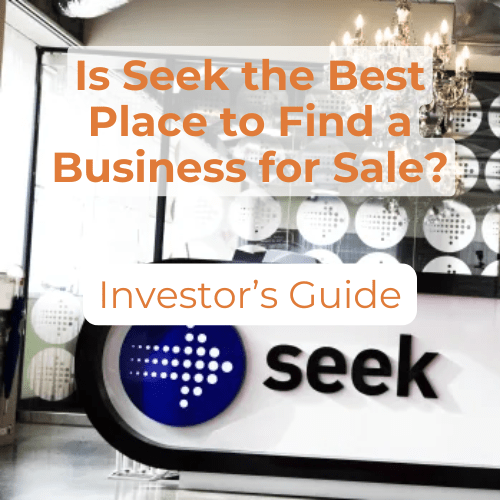
Is Seek the Best Place to Find a Business for Sale? What Investors Need to Know
Share
If you’re serious about buying a business in Australia, there’s a good chance your first Google search brought you to Seek Business. It’s one of the largest and most visited business-for-sale platforms in the country. But as any experienced investor will tell you—visibility doesn’t always equal value.
So, is Seek the best place to find your next business opportunity? Or is it just a convenient starting point in a much larger journey? Let's explore why Seek may or may not serve your investor goals, and what alternatives serious buyers are turning to in 2025.
The Case For Seek Business
Let’s give credit where it’s due. Seek Business does offer several advantages, especially for new or time-poor buyers:
- Massive Reach: Seek Business regularly features over 8,000 listings across industries and regions.
- Trusted Brand: With the backing of Seek.com.au, it carries credibility among cautious first-time buyers.
- Search Filters: Users can filter by industry, location, price, and annual turnover—giving the appearance of control and precision.
- Franchise Focus: For buyers interested in franchises, Seek aggregates a large number of resale and greenfield options.
The Core Problem: Information Asymmetry
Seek Business listings often lack the depth and rigour required to make a truly informed decision. You’ll see vague descriptors like:
- "Well-established cafe in busy area"
- "Excellent growth potential"
- "Loyal client base"
But what’s usually missing?
- Verified financials
- Breakdown of revenue streams
- Customer retention metrics
- Lease terms and obligations
- Owner’s role and required hours
And often, when you request more information, you’re met with an NDA before you’ve even seen a P&L. This makes it difficult to evaluate opportunities without jumping through hoops—and signals that many listings are designed more to generate enquiries than facilitate real deals.
Behind the Curtain: How Seek Actually Works
Most Seek Business listings aren’t placed by business owners. They’re placed by brokers using syndicated content across multiple platforms. Often, those brokers are not prioritising Seek as their primary marketing tool. Instead, they treat it as a lead capture funnel to build buyer lists.
And since the cost of listing is relatively low, there’s little incentive to keep listings current or accurate. This leads to duplicated listings, outdated financials, and generic descriptions that add no real value to the serious buyer.
Real-World Scenarios: When Seek Works (and When It Doesn’t)
✅ When Seek Works
- You're looking for a franchise opportunity with an established brand.
- You want to get a feel for pricing in a certain industry or region.
- You’re just starting out and want to learn the language of listings.
🚫 When Seek Falls Short
- You want deep, current financials up front.
- You need access to high-cashflow businesses or strategic acquisitions.
- You’re ready to deploy capital and need tailored, high-trust deal flow.
Seek vs. Other Platforms: How It Really Stacks Up
Not all platforms are created equal. Here’s how Seek compares to other major players in the Australian business-for-sale space:
| Platform | Strengths | Weaknesses |
|---|---|---|
| Seek Business | Brand recognition, large volume, great for beginners | Low detail, many low-quality listings, lacks strategic deals |
| BSale | More broker-vetted listings, industry-specific categories | Less traffic, some dated UX |
| AnyBusiness | Decent range of listings, better search filters | Still suffers from generality and shallow data |
| Practice4Sale | Tailored to healthcare, financial, and legal sectors | Too niche for general buyers |
| Facebook Marketplace | Off-market opportunities, sometimes no brokers | High noise-to-signal ratio, unverified claims |
Top 5 Questions Every Buyer Should Ask the Broker
- Why is the owner really selling?
- How dependent is the business on the owner?
- What systems are in place to ensure smooth transition?
- Are there customer or supplier concentration risks?
- What’s one thing you’d change in this business if you bought it?
These questions cut through the sales pitch and get to the real substance of the opportunity. They also signal to the broker that you're not just browsing—you’re serious.
What to Do in Your First 30 Days of Searching
Most buyers waste time during their first month—scrolling listings, second-guessing, and not moving forward. Here’s how to do it differently:
- Week 1: Define your acquisition criteria (industry, region, price range, owner role).
- Week 2: Build your list of brokers and reach out with a clear buy profile.
- Week 3: Set up deal tracking tools (Google Sheets, CRM, etc.) and request info on your top 3–5 leads.
- Week 4: Evaluate your first few opportunities using a structured due diligence checklist.
Momentum is everything. Treat your search like a pipeline and commit to weekly deal flow.
Next Steps
- 📥 Download: The Due Diligence Checklist
- 📞 Book: A 30-minute strategy call to map your acquisition journey
- 📚 Explore: The Investor Resource Hub for frameworks and buyer support
If you’re ready to stop browsing and start buying—let’s build your playbook and get you in front of the right deals, fast.
Related Reads
- Top 5 Mistakes Investors Make When Buying a Business for Sale in Australia
- Business for Sale Gold Coast QLD: Why Investors Are Flocking to This Region
- Business for Sale Tasmania: 7 Opportunities Investors Shouldn’t Miss in 2025
- You Don’t Need Permission to Do Something Extraordinary
- Build a Brave Environment That Demands Your Best (Even on Tough Days)
